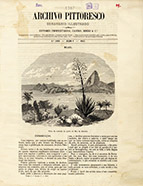

................................
Created within a specific historical context and covering key subjects in mid-19th century Portugal, Arquivo Pitoresco (AP) stands as a significant record of periodical press from that era. Published weekly by Tipografia de Castro, Irmão e Cia in Lisbon, AP was distributed on Sundays and, in some ways, continued the project initiated by Portugal’s first literary and illustrated press of the 19th century, O Panorama [The Panorama]—a prominent publication conceived by Alexandre Herculano. AP was followed by another influential project, the Revista Universal Lisbonense [Universal Lisbon Magazine] (1841-1853). Although considered secondary in importance, AP maintained a regular circulation longer than its predecessor. O Panorama , often viewed as the benchmark of Romanticism in Portugal, ran from 1837 to 1844, with brief revivals until its definitive closure in 1868. In contrast, AP circulated continuously for eleven years, with each issue comprising eight pages and a consistent cover price. Costing 2000 réis for an annual subscription in Lisbon and 2200 réis in other regions (including overseas and abroad), AP achieved notable success, rivalling the readership of Herculano’s Panorama at its peak, with print runs approaching 5,000 copies. José de Torres served as the main editor during AP's first year and part of the second, after which Francisco Pereira de Almeida took over and completed the second volume. Following them were Francisco Augusto Nogueira da Silva, António Feliciano de Castilho, António da Silva Túlio, Inácio de Vilhena Barbosa, and Pedro Wenceslau de Brito Aranha (the latter two from the ninth volume onwards). Together with other contributors, they maintained AP’s goal of combining imagery and text to make the newspaper’s content both “useful and pleasant.” Other frequent contributors included Alberto Osório de Vasconcellos, António José de Figueiredo, António Lopes Mendes, António Pedro Lopes de Mendonça, Innocencio Francisco da Silva, José Felix Nogueira, and Luís Augusto Rebello da Silva.
This work is financed by national funds through FCT - Foundation for Science and Technology, I.P, in the scope of the projects UIDB/04311/2020 and UIDP/04311/2020.
